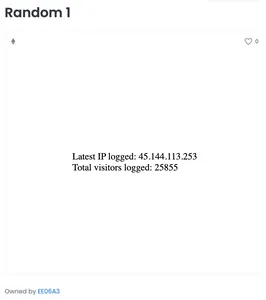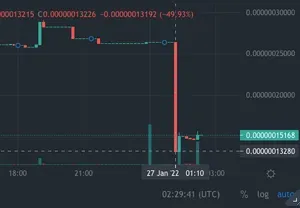Padawan DAO loses half its treasury through risky money management
Padawan DAO is a project that aims to provide funding to students under 25 to attend blockchain-related events. In early January, the DAO decided to essentially gamble with project funds on the price of Ethereum staying high: they placed the treasury's $150,000 into a collateralized debt position (CDP) for a decentralized stablecoin called DAI. As the crypto market entered a dip, the project's position went underwater and the protocol had to sell 53 ETH ($117,000) to keep the DAI fully backed. The project had been counting on Ethereum not taking a tumble below $2,200, as it did on January 27, which would have allowed them to keep their 53 ETH and cash out their DAI. Since this didn't happen, the project found itself with their budget halved.
OpenSea announces limits on free NFT minting, then reverses the decision the same day, after revealing that more than 80% of the items created through the feature were plagiarized, fake collections, or spam
On January 27, OpenSea announced a limit of five collections and 50 items per collection, after discovering that "over 80% of the items created with [their free minting tool] tool were plagiarized works, fake collections, and spam". The decision came without warning to creators, some of whom were in the process of minting items for collections that had already promised more than 50 items, and suddenly unable to complete the collections. Later that day, OpenSea announced that they had reversed the decision, saying they "should have previewed this with you before rolling it out".
Attacker exploits a bug in Qubit Finance allowing them to mint unlimited collateral and drain the platform of $80 million
An attacker exploited a bug in Qubit Finance, a decentralized lending platform. The bug allowed them to call the "deposit" function without actually depositing any funds. This enabled the attacker to mint 77,162 xETH collateral, which they exchanged for BNB worth nearly $80 million. The platform has said they have tried to contact the exploiter to offer the "maximum bounty", which is apparently $250,000. Tempting, I'm sure.
People begin creating IP-harvesting NFTs to highlight the vulnerabilities in marketplaces and wallets
MetaMask acknowledged a week ago that they'd failed to address an IP leakage "issue has been widely known for a long time". The issue is present in many NFT marketplaces and wallets, including both MetaMask and OpenSea, and presents potential privacy concerns for anonymous collectors or anyone concerned about potentially having their IP (and as a result, often geolocation information) exposed to any NFT creator. Some researchers and engineers have begun creating NFT projects that gather IPs and display them back to the viewers, as a way to highlight the vulnerability.
This is as good a time as any to remind you to use a VPN! Mullvad is a particularly good pick (#NotAnAd).
Following the Wonderland protocol disaster earlier this week, it is revealed that the pseudonymous chief developer has a long history of financial crimes and shady businesses
Sifu, the pseudonymous chief developer of the Wonderland protocol, was revealed to be Michael Patryn, previously known as Omar Dahani. Patryn was a co-founder of the Canadian exchange, QuadrigaCX, which stole $169 million in customer funds. In the mid-2000s, Patryn admitted to several crimes including credit fraud, theft, bank fraud, and burglary.
Wonderland founder Daniele Sestagalli had also been kept in the dark about the identity of his collaborator until finding out about a month ago. He opted to keep this information to himself, and claims it was because he believes in second chances. After the information became public, Sestagalli began a vote on whether Patryn should be replaced.
- Reddit thread on r/defi
- Twitter thread by zachxbt
- Twitter thread by Daniele Sestagalli
- "Stament[sic] on last Wonderland developments" by Daniele Sestagalli
- "QuadrigaCX cofounder Michael Patryn resurfaces— as 0xSifu, treasury manager of Wonderland", Amy Castor
- "Michael Patryn of QuadrigaCX is back — as 0xSifu from DeFi protocol Wonderland", David Gerard
Melania Trump apparently wash trades her own NFT
Melania Trump launched a new NFT in January, following her December unveiling of the series. The January NFT involved a white hat that Ms. Trump wore during a state visit, as well as a watercolor painting of her wearing it. The press release announcing it also announced that the opening bid would be "the equivalent of $250,000", or around 1,800 SOL. Ultimately the auction drew only a few bids, all around the starting price. A Vice investigation subsequently found that the winning buyer bought the NFT with funds that came from the same address that had created the NFT to begin with. Pesky public transaction records...
Creators of the play-to-earn game "Mercenary" rug pull for more than $760,000
Mercenary was a short-lived play-to-earn game that promised "innovative tokenomics, to ensure the stability and longevity of the game's economy". The project had invested heavily in advertising on Twitter and in cryptocurrency outlets like BSC News to attract new players. It launched only a week before the developers rug-pulled on January 27, draining more than $760,000 and deleting the project's website and social media.
New Zealand auction house Webb's invites buyers of historic glass negative and associated NFT to "make it permanently digital" by smashing the plate after they buy it
New Zealand auction house Webb's is selling the original glass plate negatives of two photographs taken of artist Charles Goldie sometime between 1910 and 1920. The sale also includes an NFT of a print of the photo (although the listing seems more excited about the NFT than the negative: "The purchaser of the NFT will also receive a framed contact print of the image and the original glass plate negative in a custom-built pine box"). In a bizarre move, Webb's decided to sell the glass plate along with a small brass hammer. Head of art at Webbs, Charles Ninow, said, "Perhaps you might want to make it permanently digital. Smash it? Smash it."
Sports fans face losses as IQONIQ platform liquidates and token value plummets
"Fan engagement blockchain platform" IQONIQ went into liquidation late January 2022, taking down its token sale platform and crashing the value of the fan-owned coin by over 90%. The platform had major sponsorship deals with multiple Formula 1 teams, European soccer clubs, and the Spanish La Liga league, which it owes €820,000 ($914,500). The collapse of such a major and highly-visible platform led the Football Supporters' Association to call for more regulations on cryptocurrency platforms.
"Let's Go Brandon" coin suddenly drops 50% in value
The "Let's Go Brandon" $LGB coin tied to NASCAR driver Brandon Brown, and created as an apparent way to support "the American dream" and stick it to Joe Biden (somehow), suddenly dropped 50% in value. This appeared to be the death knell of a coin that had been dropping precipitously since the early January announcement by NASCAR that they would be rescinding their approval for LGBcoin to sponsor Brown.










